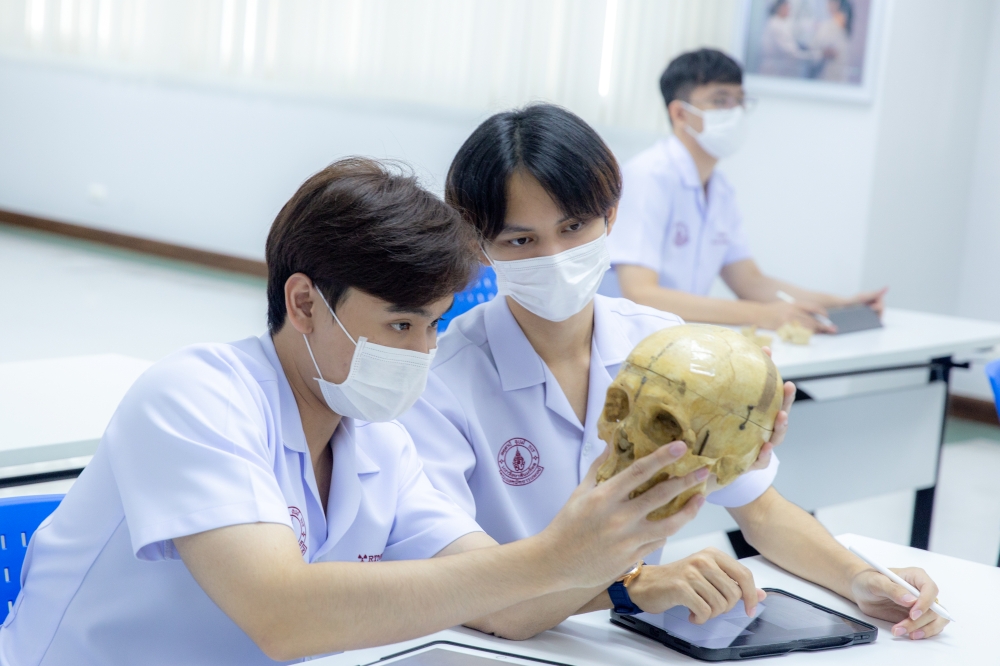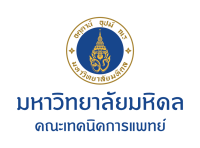Radiological Technology

Program aims
To produce professional radiological technologists who are able to integrate radiological sciences’ knowledge and skills to competently perform clinical practices in diagnostic radiology, nuclear medicine, and radiation therapy with integrity and professional ethics.
Program objectives
1. Integrating theoretical and practical knowledge in medical radiation science and technology, including radiation physics and instrumentation, radiation protection and safety, and digital image processing to conduct clinical practices.
2. Performing clinical practices in diagnostic radiology, nuclear medicine, and radiation therapy according to national competencies and international standards in radiological technology, including ASMIRT and EANM competencies.
3. Work in clinical practices with good communication, multidisciplinary teamwork skills, responsibility for self and group works, and professional ethics.
4. Possess critical thinking, problem solving, information technology skill, life-long learning to develop themselves and be beneficial to the profession.
Program’s educational philosophy
The program of B.Sc. (Radiological Technology) of the Faculty of Medical Technology is organized and taught based on the concept of outcome-based education, learning-centered approach, and constructivism which encourages continuous self-learning and self-development of students to be professional graduates who have professional knowledge and skills with good attitude, morality, and ethics by considering what is beneficial for the public.
Expected Learning Outcomes
1. Apply basic and radiological sciences to analyze, plan procedures and select the appropriate instruments and equipment, and exposure techniques for diagnosis and treatment in diagnostic radiology, nuclear medicine, and radiation therapy.
2. Utilize instruments and equipment for diagnosis and/or treatment in diagnostic radiology, nuclear medicine, and radiation therapy according to the professional standards.
3. Perform patient procedure and care with consideration of patients’ appropriateness to deliver safe practice in diagnostic and treatment procedures according to the professional standards.
4. Conduct oneself with integrity and responsibility under the laws and professional ethics of radiological technology.
5. Demonstrate effective collaboration and multidisciplinary skills with colleagues and interprofessional team for providing service.
6. Communicate information related to radiological technology in both formal and informal formats appropriate for the audience.
7. Conduct research related to radiological technology, in accordance with research methodology and ethics.
Admission Requirements and Criteria
• All application must hold a Grade 12 certificate or an equivalent certificate issued by the Ministry of Education in Science program.
• Information regarding the number of students accepted and score criteria for admission can be found at: https://tcas.mahidol.ac.th/
• General admission rounds include:
– Round 1/2: Portfolio
– Round 2: Quota
– Round 3: Admission
Selection Method
Applicants must meet the admission criteria above. Selection will then be based on the following:
• Round 1/2 (Portfolio): TGAT score, portfolio score, and interview score
• Round 2 (Quota) and Round 3 (Admission): A-level scores in Physics, Chemistry, Biology and Mathematics 1, TGAT score, and interview score
Academic System
Credit system with two semesters per academic year.
Duration of Study
The program duration is 4 years for Bachelor of Science in Radiological Technology [B.Sc. (Radiological Technology)].
Registration
Students must register as full-time students.
Program structure
| Course | Credits |
| General education courses | 30 |
| Basic science courses | 33 |
| Professional courses | 79 |
| Elective courses | 6 |
| Total | 148 |
Study Plan
Please click here for more details on the study plan.
Course description
Please click here for more details on the course description.
Teaching and Learning Method
Interaction-based lectures, group discussions, presentations, laboratory work, assignments, demonstrations, scenario-based learning, experiment-based learning, case studies, activity-based learning, and clinical practicum.
Collaboration with other institutes/organizations
The Faculty collaborates with both academic and professional institutions, inside and outside Mahidol University, across government and private sectors. These collaborations support research, guest/special/invited lecturers, instructors for class teaching, radiological technology practice ,and student apprenticeships.
Graduation Requirements
1. Complete all study requirements in not less than 3 academic years (6 semesters) and not more than 8 academic years (16 semesters).
2. Successfully complete all required courses as outlined in the curriculum, including general education, basic and professional education, and free elective courses, for a total of no fewer than 148 credits with a cumulative grade point average (cGPA) of at least 2.00.
3. Complete a senior project and submit a final report prepared according to the Faculty of Medical Technology regulations, within the specified period, and receive a grade of “S or O.”
4. Pass an English proficiency examination in accordance with Mahidol University regulations.
5. Achieve a grade of not less than 2.00 in professional courses.
6. Pass a comprehensive examination provided by the program.
Job Opportunities
Graduates of the Radiological Technology Program must pass the professional license examination to legally work in a radiological departments of government and private hospitals. Additionally, career paths include sales representatives, product/application specialists in medical or radiological supplier companies, product or sales managers, and teaching assistant in academic institutions.
Graduates may also pursue higher degreess (Master’s and Doctoral degrees), engaging in research project in areas such as radiological technology, medical radiation science, medical physics, biomedical engineering, information science or other related fields, both nationally and internationally.
Information updated JUNE 2025



For more information please contact
Assoc. Prof. Dr. Woranut Iampa
Chairman of the B.Sc. (Radiological Technology) Program
E-mail : woranut.iam@mahidol.ac.th

